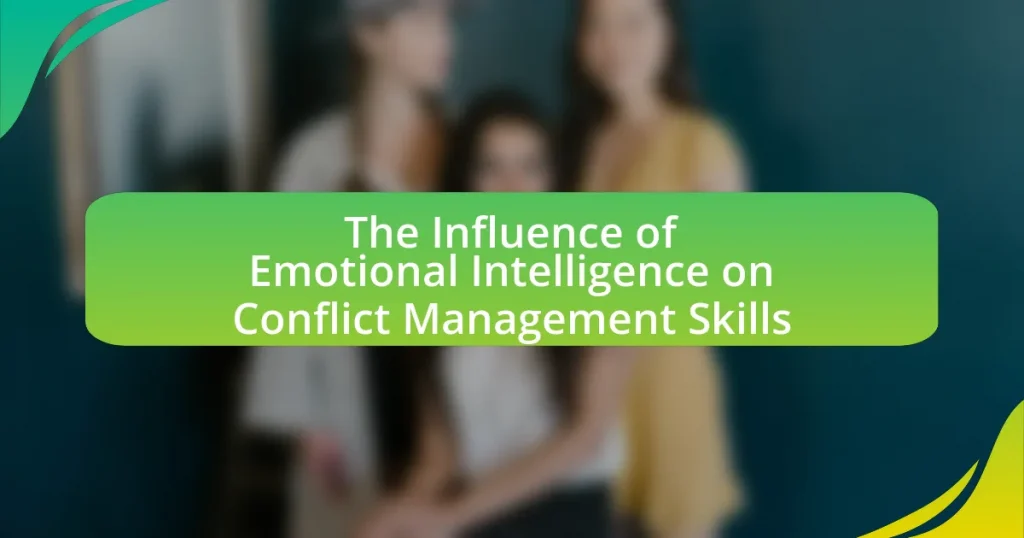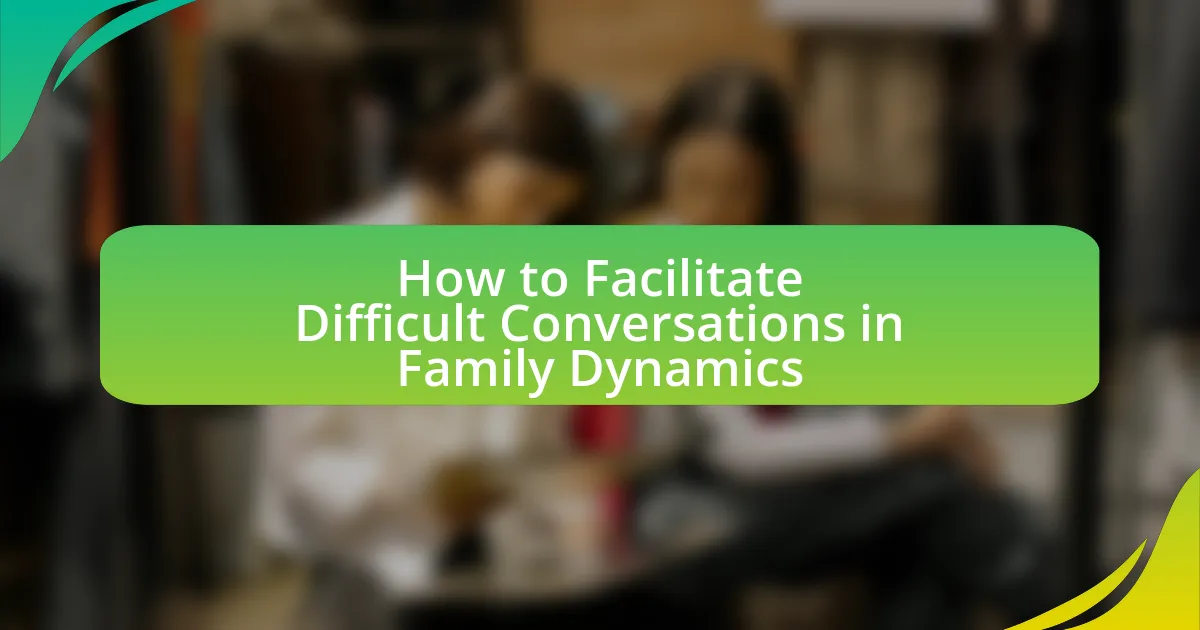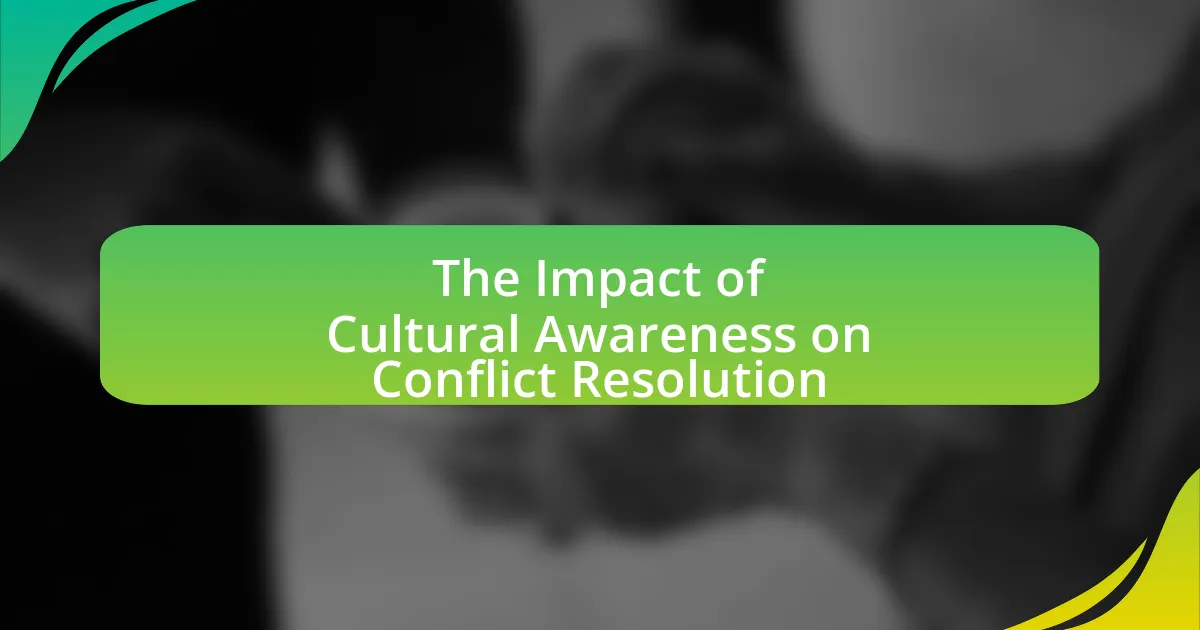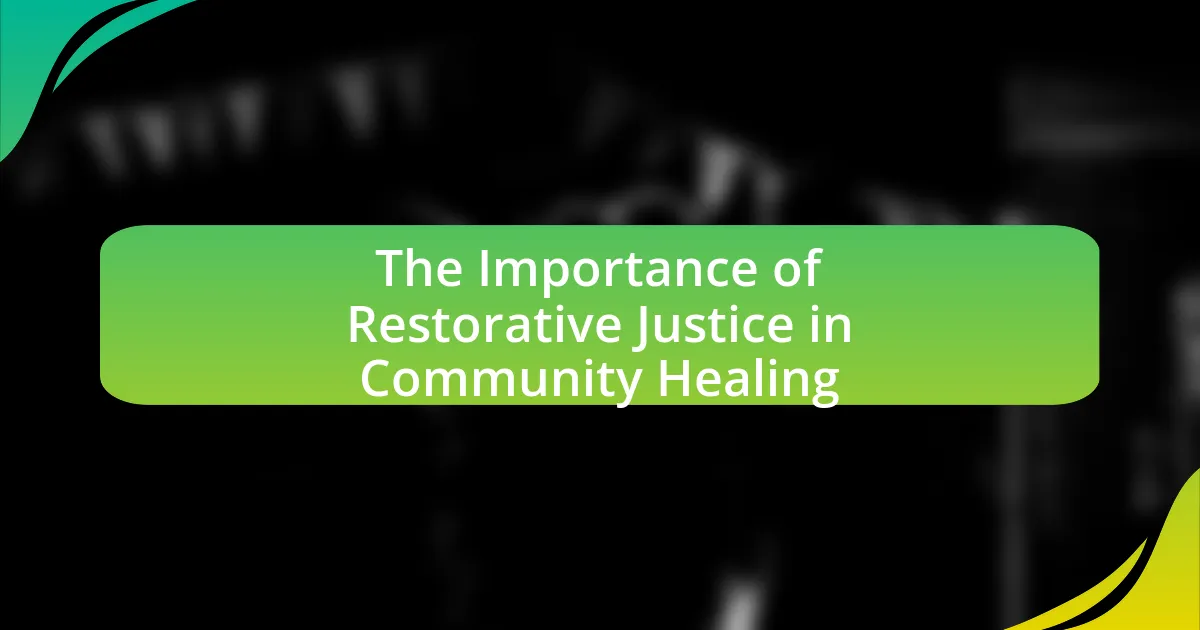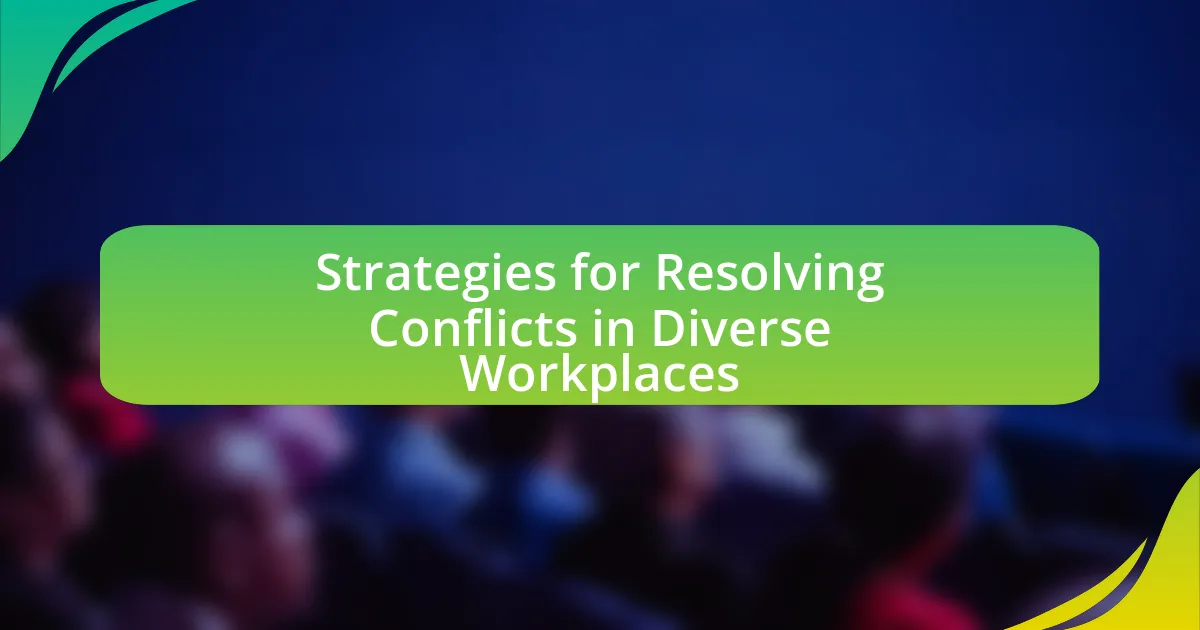Emotional intelligence (EI) plays a crucial role in enhancing conflict management skills by enabling individuals to recognize, understand, and regulate their own emotions as well as those of others. The article explores how components of EI, such as self-awareness, empathy, and effective communication, facilitate better conflict resolution and promote collaborative outcomes. It also examines various conflict management styles influenced by EI, the challenges faced in applying EI in conflicts, and practical strategies for developing EI to improve conflict management abilities. Research findings underscore the importance of EI in fostering constructive dialogue and reducing tensions in interpersonal disputes.
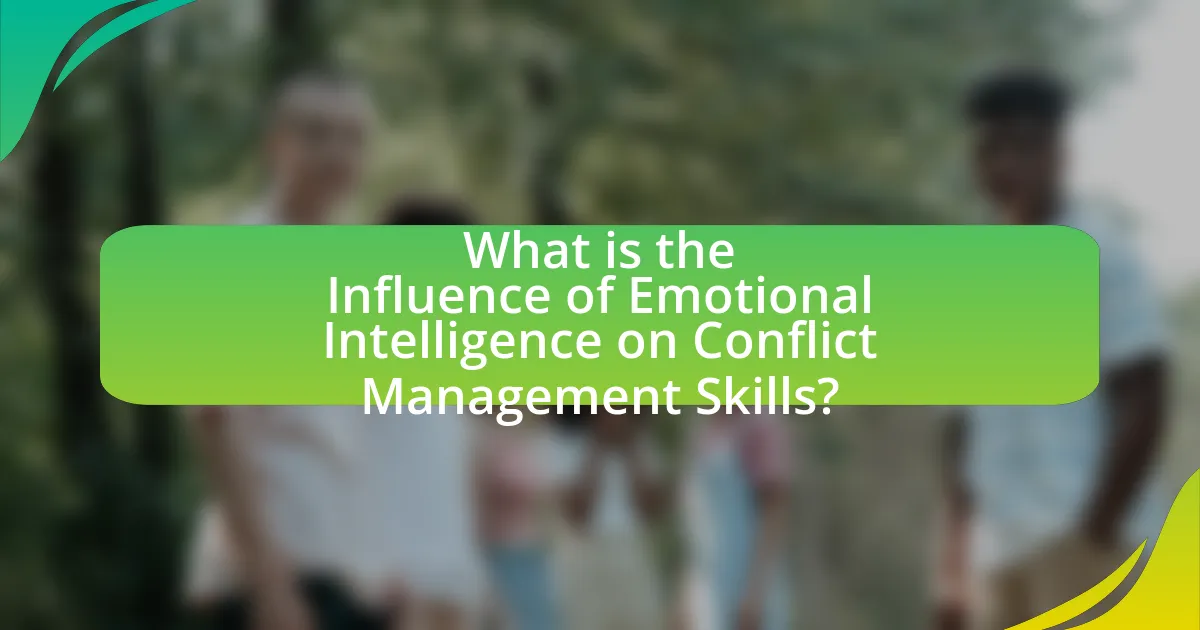
What is the Influence of Emotional Intelligence on Conflict Management Skills?
Emotional intelligence significantly enhances conflict management skills by enabling individuals to recognize, understand, and manage their own emotions and those of others. This heightened awareness facilitates better communication, empathy, and problem-solving during conflicts. Research by Mayer, Salovey, and Caruso (2004) indicates that individuals with high emotional intelligence are more adept at navigating interpersonal disputes, as they can effectively regulate their emotional responses and respond to others’ emotions constructively. Consequently, this leads to more effective resolution strategies, fostering collaboration and reducing the likelihood of escalation in conflicts.
How does Emotional Intelligence impact conflict resolution?
Emotional Intelligence significantly enhances conflict resolution by enabling individuals to recognize, understand, and manage their own emotions as well as those of others. This heightened awareness fosters empathy, allowing for better communication and collaboration during conflicts. Research indicates that individuals with high Emotional Intelligence are more adept at de-escalating tensions and finding mutually beneficial solutions, as they can navigate emotional dynamics effectively. For instance, a study published in the Journal of Organizational Behavior found that teams with higher Emotional Intelligence demonstrated improved conflict resolution skills, leading to more positive outcomes and reduced workplace stress.
What are the key components of Emotional Intelligence relevant to conflict management?
The key components of Emotional Intelligence relevant to conflict management are self-awareness, self-regulation, empathy, social skills, and motivation. Self-awareness allows individuals to recognize their own emotions and how they affect their behavior, which is crucial in conflict situations. Self-regulation enables individuals to manage their emotions and reactions, preventing escalation during conflicts. Empathy involves understanding the emotions of others, facilitating better communication and resolution. Social skills are essential for effective interaction and collaboration, helping to navigate conflicts constructively. Lastly, motivation drives individuals to seek positive outcomes and maintain relationships, which is vital in conflict management. Research by Goleman (1995) highlights these components as foundational for effective interpersonal interactions, particularly in resolving conflicts.
How do these components facilitate better conflict resolution?
Components of emotional intelligence, such as self-awareness, empathy, and effective communication, facilitate better conflict resolution by enabling individuals to understand their own emotions and those of others. Self-awareness allows individuals to recognize their emotional triggers and manage their responses, reducing the likelihood of escalation during conflicts. Empathy fosters a deeper understanding of differing perspectives, which can lead to more collaborative solutions. Effective communication skills ensure that individuals can express their thoughts and feelings clearly, promoting open dialogue and reducing misunderstandings. Research indicates that teams with high emotional intelligence experience 20% less conflict and achieve resolutions more efficiently, demonstrating the tangible benefits of these components in conflict management.
Why is Emotional Intelligence important in managing conflicts?
Emotional Intelligence is crucial in managing conflicts because it enables individuals to understand and regulate their own emotions while empathizing with others. This understanding fosters effective communication, allowing parties to express their feelings and concerns constructively. Research indicates that individuals with high Emotional Intelligence are better equipped to navigate disagreements, as they can recognize emotional cues and respond appropriately, reducing the likelihood of escalation. For instance, a study published in the Journal of Organizational Behavior found that teams with higher Emotional Intelligence demonstrated improved conflict resolution skills, leading to more collaborative outcomes.
What role does self-awareness play in conflict management?
Self-awareness plays a crucial role in conflict management by enabling individuals to recognize their own emotions, triggers, and biases during conflicts. This recognition allows for better regulation of emotional responses, leading to more constructive interactions. Research indicates that self-aware individuals are more likely to engage in active listening and empathy, which are essential for resolving disputes effectively. For instance, a study published in the Journal of Organizational Behavior found that higher levels of self-awareness correlate with improved conflict resolution skills, as individuals can better understand their own perspectives and those of others involved in the conflict.
How does empathy contribute to effective conflict resolution?
Empathy significantly contributes to effective conflict resolution by enabling individuals to understand and share the feelings of others involved in the conflict. This understanding fosters open communication, allowing parties to express their perspectives and emotions without fear of judgment. Research indicates that empathetic engagement can lead to more collaborative problem-solving, as it encourages individuals to consider the needs and viewpoints of others, thereby reducing hostility and promoting compromise. A study published in the Journal of Conflict Resolution found that empathy is linked to increased cooperation and decreased aggression in conflict situations, highlighting its role in facilitating constructive dialogue and resolution.
What are the different styles of conflict management influenced by Emotional Intelligence?
The different styles of conflict management influenced by Emotional Intelligence include collaboration, compromise, avoidance, accommodation, and competition. Collaboration involves working together to find a mutually beneficial solution, which is facilitated by high emotional awareness and empathy. Compromise requires both parties to give up something to reach an agreement, often relying on emotional regulation to manage expectations. Avoidance entails sidestepping the conflict, which may stem from a lack of emotional confidence or fear of confrontation. Accommodation involves prioritizing the other party’s needs over one’s own, reflecting high emotional sensitivity. Competition focuses on winning the conflict, often at the expense of the other party, and can be driven by low emotional intelligence, leading to escalated tensions. Research indicates that individuals with higher emotional intelligence are more likely to employ collaborative and compromising styles, as they can better understand and manage their own emotions and those of others, thus fostering more effective conflict resolution.
How do assertive and cooperative styles relate to Emotional Intelligence?
Assertive and cooperative styles are closely linked to Emotional Intelligence, as both styles require the ability to understand and manage one’s own emotions and the emotions of others. Assertiveness involves expressing one’s needs and opinions confidently while respecting others, which reflects high self-awareness and self-regulation—key components of Emotional Intelligence. Cooperative styles emphasize collaboration and empathy, requiring individuals to recognize and respond to the emotions of others effectively. Research indicates that individuals with higher Emotional Intelligence are more adept at employing both assertive and cooperative strategies in conflict management, leading to more constructive outcomes in interpersonal interactions.
What are the outcomes of different conflict management styles?
Different conflict management styles yield distinct outcomes that can significantly affect interpersonal relationships and organizational dynamics. For instance, the collaborative style often leads to win-win solutions, fostering trust and mutual respect among parties, as evidenced by research indicating that collaboration enhances team cohesion and satisfaction (Thomas-Kilmann Conflict Mode Instrument). In contrast, the avoidance style may result in unresolved issues, leading to increased tension and resentment over time, which can negatively impact team morale and productivity. The competitive style, while potentially effective in achieving quick results, often damages relationships and can create a hostile environment, as highlighted by studies showing that aggressive tactics can lead to long-term conflict escalation. Lastly, the accommodating style may preserve harmony but can result in the neglect of one’s own needs, leading to feelings of frustration and imbalance in relationships. Thus, the choice of conflict management style directly influences the effectiveness of conflict resolution and the overall health of interpersonal interactions.
How can Emotional Intelligence be developed to enhance conflict management skills?
Emotional Intelligence can be developed to enhance conflict management skills through targeted training and self-awareness practices. Engaging in emotional intelligence training programs, such as those based on the Emotional Competence Framework by Daniel Goleman, can improve skills like empathy, self-regulation, and social awareness, which are crucial for effective conflict resolution. Research indicates that individuals with higher emotional intelligence are better equipped to navigate interpersonal conflicts, as they can recognize and manage their own emotions while also understanding the emotions of others. For instance, a study published in the Journal of Organizational Behavior found that emotional intelligence training significantly improved participants’ conflict management abilities, leading to more constructive outcomes in workplace disputes.
What training methods are effective for improving Emotional Intelligence?
Effective training methods for improving Emotional Intelligence include experiential learning, role-playing, and mindfulness practices. Experiential learning allows individuals to engage in real-life scenarios that enhance self-awareness and empathy, which are crucial components of Emotional Intelligence. Role-playing exercises provide opportunities to practice emotional responses and develop interpersonal skills in a controlled environment. Mindfulness practices, such as meditation and reflective journaling, help individuals increase their emotional awareness and regulation. Research indicates that these methods lead to significant improvements in Emotional Intelligence, as evidenced by studies showing enhanced emotional regulation and interpersonal effectiveness among participants who underwent such training.
How can individuals practice Emotional Intelligence in real-life conflict situations?
Individuals can practice Emotional Intelligence in real-life conflict situations by actively listening, managing their emotions, and demonstrating empathy. Active listening involves fully concentrating on the speaker, which helps in understanding their perspective and reduces misunderstandings. Managing emotions means recognizing one’s feelings and responding appropriately, rather than reacting impulsively. Demonstrating empathy allows individuals to connect with others’ feelings, fostering a collaborative atmosphere. Research indicates that high Emotional Intelligence correlates with better conflict resolution skills, as individuals who can regulate their emotions and understand others’ emotions are more effective in resolving disputes.
What are the challenges in applying Emotional Intelligence to conflict management?
The challenges in applying Emotional Intelligence (EI) to conflict management include difficulties in self-regulation, misinterpretation of emotions, and varying levels of EI among individuals involved. Self-regulation can be challenging as individuals may struggle to manage their own emotions during conflicts, leading to escalated tensions. Misinterpretation of emotions occurs when individuals fail to accurately perceive the emotional states of others, which can result in inappropriate responses and further conflict. Additionally, the varying levels of EI among individuals can create disparities in conflict resolution approaches, making it difficult to reach a consensus or effectively manage the situation. These challenges highlight the complexities of integrating EI into conflict management strategies.
What common barriers hinder the use of Emotional Intelligence in conflicts?
Common barriers that hinder the use of Emotional Intelligence in conflicts include lack of self-awareness, emotional dysregulation, and poor communication skills. Lack of self-awareness prevents individuals from recognizing their own emotions and how these affect their behavior, which can escalate conflicts. Emotional dysregulation leads to difficulty in managing emotions, resulting in impulsive reactions rather than thoughtful responses. Poor communication skills hinder the ability to express feelings and needs effectively, often leading to misunderstandings and further conflict. Research indicates that these barriers significantly impact conflict resolution, as individuals who struggle with these aspects are less likely to engage in constructive dialogue and empathy, essential components of Emotional Intelligence.
How can these barriers be overcome?
Barriers to effective conflict management can be overcome by enhancing emotional intelligence through targeted training and development programs. Research indicates that individuals with higher emotional intelligence are better equipped to recognize and manage their own emotions and those of others, leading to improved conflict resolution outcomes. For instance, a study published in the Journal of Organizational Behavior found that emotional intelligence training significantly improved participants’ conflict management skills, demonstrating a direct correlation between emotional awareness and effective resolution strategies. By implementing such training, organizations can foster a culture of empathy and understanding, thereby reducing barriers to conflict management.
What practical strategies can enhance the influence of Emotional Intelligence on conflict management skills?
Practical strategies that can enhance the influence of Emotional Intelligence on conflict management skills include active listening, empathy development, and self-regulation techniques. Active listening allows individuals to fully understand the perspectives of others, which is crucial in resolving conflicts effectively. Research indicates that effective communication, a key component of Emotional Intelligence, significantly reduces misunderstandings and fosters collaboration (Goleman, 1995).
Empathy development involves recognizing and validating the emotions of others, which can lead to more constructive dialogue and resolution. Studies show that empathetic leaders are more successful in conflict resolution, as they create an environment of trust and openness (Kellett, Humphrey, & Sleeth, 2006).
Self-regulation techniques, such as mindfulness and stress management, enable individuals to maintain composure during conflicts, allowing for clearer thinking and better decision-making. Evidence suggests that individuals with high Emotional Intelligence are better at managing their emotions, leading to more effective conflict resolution outcomes (Mayer, Salovey, & Caruso, 2004).
Implementing these strategies can significantly enhance the role of Emotional Intelligence in managing conflicts effectively.
